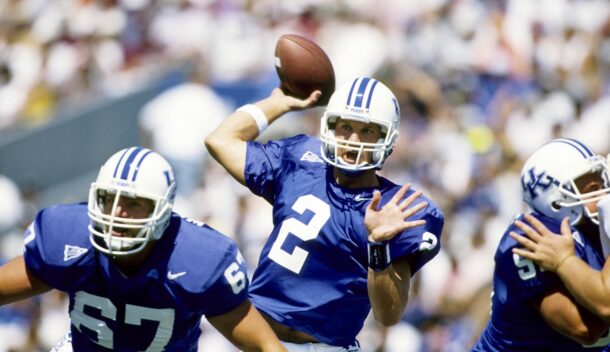Is the college officiating system broken? Real referees explain how to fix it
Some NFL officials make $200,000 in one season.
That’s enough that it’s a full-time job. It makes the spots competitive, is enough that it seems fair to hold them accountable for mistakes and it also allows the NFL to require a lot of training.
At the college level, it’s a different set of circumstances. And, though fans love yelling about officiating at all levels, people in power believe the rules enforcers are at a big disadvantage in college.
CBS wrote a fantastic, well-reported piece on the state of college football officiating. In it, power-conference officials, officiating supervisors and college officials themselves brought up several issues hampering the current group.
But the bottom line is that in a multi-billion dollar industry, officiating remains little more than a gig partaken for “the love of the game.”
Many college officials are making $2,500 or $3,000 per game, but also paying for their own travel expenses out of pocket. After taxes and expenses, a college official is likely to pocket something like $15,000 per year.
On top of that, entire crews have started to be suspended or punished publicly for missed calls, sometimes for public relations purposes. Some are penalized even though it was a member of their crew, not them, who missed a call.
“The accountability for officials is messed up,” an anonymous college official told CBS. “Sometimes you get a high level of accountability for things you really don’t deserve, and sometimes you have no accountability for things that deserve it. It’s really not handled well from league to league, from incident to incident.
“You can see across the grid those officials who are in it for the right reasons and those who aren’t. Our evaluation process is all over the map. It’s really not that good. It appears accountability tends to rest in the eyes of how big (a mistake) gets publicly rather than doing what most organizations say and that is just say, ‘This is what we expect.’”
The pay rate makes it difficult to get college officials enough training and difficult to require a certain level of athleticism. There’s not as much competitive incentive.
Any sort of public accountability generally is dictated by the Twitter mob and isn’t formalized.
One power-conference official that CBS spoke with for the story suggested that college football follow the new NBA model and release “right call/wrong call” reports through the media with explanations.
The same official suggested that it’s a mistake to tie officials to certain conferences. Instead, he or she argued, there should be a national pool, and let’s pick the best officials to handle the best games.
The system for identifying, training and evaluating replay officials also is less than ideal, according to several insiders. Sometimes replay officials are making a judgment call just like officials on the field, but although they have the use of slow-motion video, they may not know the rules as well or have as much training as those making the calls on the field.
“I’m an official at heart and I know when people are motivated and appreciated you get better production out of them,” Big Ten officiating coordinator Bill Carollo said.
“You treat them poorly, they think this isn’t worth it and they wonder, ‘Why am I doing this when I get yelled at, my name is in the paper and after taxes, I’m not making much? Does it say stupid on my forehead?’ But we do it because we love it.
“It is a concern if we’re getting the right talent in officiating. It’s not always money. We can improve it if we’re smart about it and get better people, younger people, athletic people — whatever it may be.”
An itinerant journalist, Christopher has moved between states 11 times in seven years. Formally an injury-prone Division I 800-meter specialist, he now wanders the Rockies in search of high peaks.







